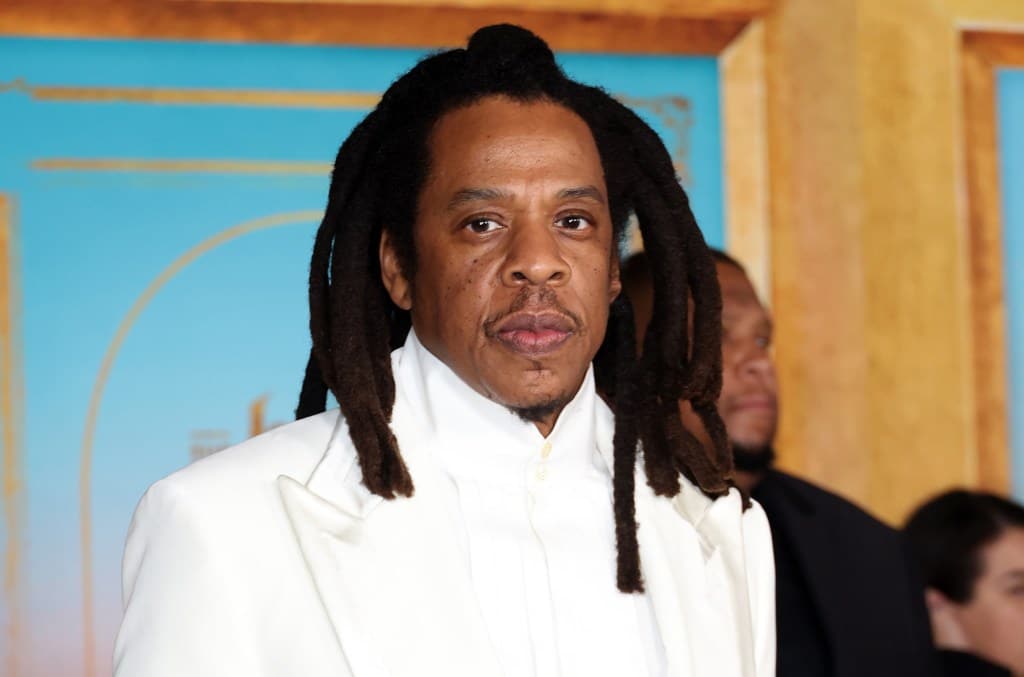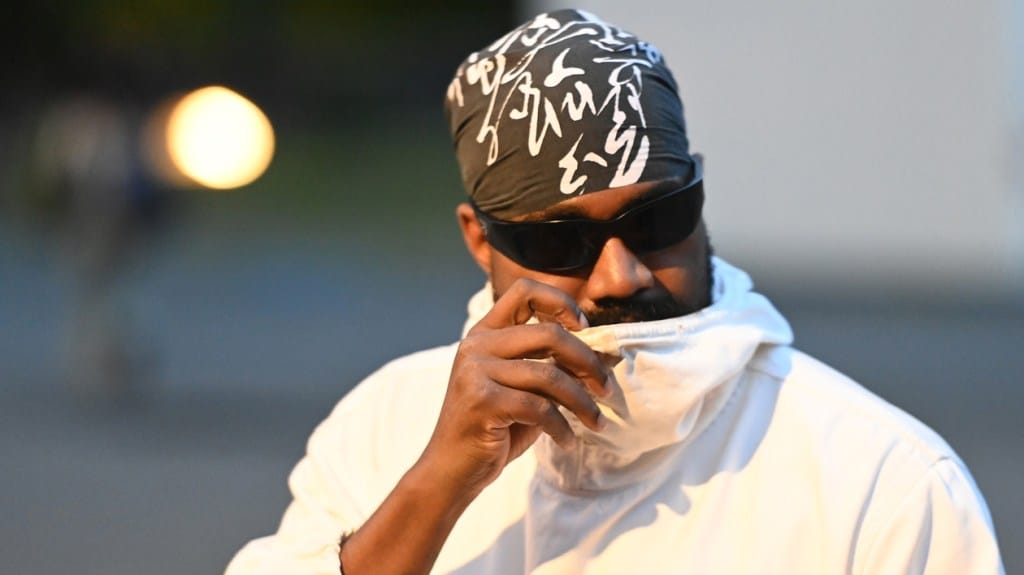Lawsuit
Page: 12
A lawsuit accusing Bassnectar (born Lorin Ashton) of sexually abusing three underage girls has been settled ahead of trial. According to court documents filed in U.S. District Court in Tennessee on Tuesday (Feb. 18), the case against the electronic music producer was dismissed with prejudice, meaning it cannot be refiled, after the two sides reached […]
The civil lawsuit accusing Jay-Z (Shawn Carter) of raping a 13-year-old girl alongside Sean “Diddy” Combs in 2000 has been voluntarily dismissed, according to court documents filed on Friday (Feb. 14).
“Today is a victory. The frivolous, fictitious and appalling allegations have been dismissed,” Carter wrote in a post on Roc Nation’s official Instagram account. “This civil suit was without merit and never going anywhere. The fictional tale they created was laughable, if not for the seriousness of the claims. I would not wish this experience on anyone. The trauma that my wife, my children, my loved ones and I have endured can never be dismissed.”
The case was dismissed with prejudice against all defendants, meaning it cannot be refiled.
Filed in New York federal court in December, the complaint alleged that Carter and Combs drugged and assaulted the Jane Doe plaintiff during an after-party following the MTV Video Music Awards. The case arrived as an updated version of a previous lawsuit filed against Combs only.
At the time, Carter called the lawsuit a “blackmail attempt” designed to result in a settlement. He further called the Jane Doe’s attorney, Tony Buzbee — notable for filing a slew of sexual assault lawsuits against Combs — a “fraud,” a “deplorable human” and an “ambulance chaser in a cheap suit.”
In his Instagram post on Friday, Carter took further aim at Buzbee, writing, “This 1-800 lawyer gets to file a suit hiding behind Jane Doe, and when they quickly realize that the money grab is going to fail, they get to walk away with no repercussions. The system has failed.
“The court must protect victims, OF COURSE, while with the same ethical responsibility, the courts must protect the innocent from being accused without a shred of evidence. May the truth prevail for all victims and those falsely accused equally.”
In a statement sent to Billboard, Carter’s attorney, Alex Spiro, said the following: “The false case against JAY-Z, that never should have been brought, has been dismissed with prejudice. By standing up in the face of heinous and false allegations, Jay has done what few can — he pushed back, he never settled, he never paid 1 red penny, he triumphed and cleared his name.”
“Today’s complete dismissal without a settlement by the 1-800 attorney is yet another confirmation that these lawsuits are built on falsehoods, not facts,” said a lawyer for Combs in a statement. “For months, we have seen case after case filed by individuals hiding behind anonymity, pushed forward by an attorney more focused on media headlines than legal merit. Just like this claim, the others will fall apart because there is no truth to them. Sean Combs has never sexually assaulted or trafficked anyone—man or woman, adult or minor. No number of lawsuits, sensationalized allegations, or media theatrics will change that reality. We will continue to fight these baseless claims and hold those responsible. This is just the first of many that will not hold up in a court of law.”
Buzbee declined to comment on the dismissal.
This story was updated to add statements from Carter and Combs’ attorneys.
HipHopWired Featured Video
Source: The Washington Post / Getty
Kanye West’s hate speech had landed him in another legal battle. A former Jewish employee has filed a claim against him for anti-semitism and more.
Variety Magazine is reporting that an unidentified woman who once worked at YEEZY is seeking damages against Kanye West. Jane Doe claims the performer harassed her and other workers via text messages because of her Jewish faith. Some of the hateful messages included “I Am A Nazi,” and “Welcome to the first day of working for Hitler.” She details that the harassment started in January of 2024. A couple of weeks later Kanye issued an apology in Hebrew but started using similar hateful language towards the staff shortly after.
The marketing executive suggested Kanye West denounce any ties to Nazism in an effort to better position his forthcoming album at the time Vultures Vol. 1. This suggestion was communicated to Ye by another employee to which West allegedly responded “I Am A Nazi” via text. Jane Doe says she was terminated from the company in March 2024 only to be rehired shortly after with her salary doubled. Later in June she claims Kanye sent out another text to several employees asking “What the F*** Is Everybody Here Getting Paid?” He targeted her a series of messages including “Come destroy me bi***.”
The suit not only alleges that Kanye West was guilty of religious discrimination but also gender discrimination and wrongful termination. “Ye waged a relentless and deliberate campaign of antisemitism and misogyny against my client,” said the plaintiff’s lawyer, Carney Shegerian. “His appalling treatment of women and fixation on Nazism, evident in abusive texts where he repeatedly calls himself Hitler, expose his motives. We need to stop excusing Ye’s behavior. As a father, husband, and employer, he must be held accountable. Ye dared my client to sue, and we will see him in court.”
Last week Ye’s X account, formerly known as Twitter, was deactivated due to similar rants where he referred to himself as a Nazi, complimented Adolf Hitler and even said “JEWS WERE BETTER AS SLAVES YOU HAVE TO PUT YOUR JEWS IN THEIR PLACE AND MAKE THEM INTO YOUR SLAVES.” Since then he has been dropped by his talented agency and Shopify suspended his http://www.yeezy.com e-commerce store.
Kanye West nor his representatives have yet to formally comment on the lawsuit.
Ye (formerly Kanye West) is facing a lawsuit from a former employee who says the rapper compared himself to Hitler and threatened her because she is Jewish.
The case, filed Tuesday (Feb. 11) in Los Angeles court, claims he subjected the unnamed woman to “antisemitic vitriol,” including texting her “Hail Hitler” and calling her “ugly” and a “bitch.” And the woman says she was “swiftly terminated” when she complained.
“Ye carried out a calculated campaign to threaten and psychologically torment Jewish people around him, specifically plaintiff,” the woman’s lawyers wrote. “There can be little doubt that Ye treats those around him, especially Jewish people and women, much worse than just a bully. He is a self-proclaimed ‘Nazi’.”
The Jane Doe accuses Ye and his Yeezy LLC of religious and gender discrimination, wrongful termination, breach of contract, and a variety of other legal wrongdoing.
The new lawsuit, one of many filed by former employees against Ye, came days after he went on an offensive tirade on X (formerly Twitter) that included antisemitic comments (“I’m a Nazi” and praise for Adolf Hitler) as well as a bizarre demand to free Sean “Diddy” Combs, who is currently in custody awaiting trial on sex crime charges. On Sunday, Ye ran a TV ad during the Super Bowl that directed viewers to an online store where they could purchase a shirt emblazoned with a swastika.
It was hardly the first time the rapper has made such statements. After a string of similar antisemitic rhetoric and other erratic behavior in October 2022, the star lost much of what was a once-formidable business empire, including fashion partnerships with Adidas, The Gap and Balenciaga, as well as his representation by Creative Artists Agency and many of his lawyers.
In Tuesday’s lawsuit, the Jane Doe plaintiff says she was hired at Ye’s Yeezy LLC as a marketing specialist in December 2023, shortly before he issued an apology (written in Hebrew) for those earlier antisemitic statements. But she says the apologetic sentiment was “short lived.”
A month later, amid renewed controversy over the cover art of his Vultures Vol. 1, the woman claims she suggested that Ye issue a statement condemning Nazism. When the message was relayed to the star himself, he allegedly responded with a text message (included in the lawsuit) reading “I Am A Nazi.”
“This not only deeply offended Doe but the loud and proud antisemitism also made her feel endangered,” her attorneys wrote.
Months later, the rapper allegedly texted her and another Jewish employee “What the fuck is everyone here getting paid?” In another screenshotted text, he allegedly followed up: “Welcome to the first day of working for Hitler.”
The abuse allegedly escalated from there, the lawsuit says, including a series of texts in June 2024 in which Ye allegedly said “Shut the f— up b—-” called her “ugly as f—” and texted “Hail Hitler.” Later, he also allegedly texted, “You what’s left after I said deathcon” — a message that Jane Doe says was intended to reference his previous antisemitic rants and meant as a threat based on her religion.
Just hours after she complained about the text messages to her manager, the lawsuit says she was sent an email from an attorney representing Yeezy terminating her employment.
A spokesman for Ye did not immediately return a request for comment on Tuesday (Feb. 11).
Don Henley and his longtime manager Irving Azoff are being sued by one of the men who was criminally charged — and later vindicated — for allegedly attempting to sell handwritten lyrics connected to the Eagles‘ 1976 album Hotel California, claiming they and their attorneys engaged in a “malicious prosecution” that harmed his reputation and caused him financial losses and emotional distress.
The complaint, filed in New York state court on Thursday (Feb. 6), was filed against Henley, Azoff and the firms that represented them in their case: Manatt, Phelps & Phillips and Loeb & Loeb. In it, Horowitz claims the parties falsely alleged that he and his two co-defendants in the criminal case “knew or had reason to believe” that the lyric sheets “had been unlawfully obtained” and nonetheless attempted to profit off of them via an online auction. However, Horowitz claims the men and their attorneys knew all along that the notes had been acquired through legal means in the first place.
Trending on Billboard
Horowitz, a rare book dealer, and his co-defendants — Rock & Roll Hall of Fame curator Craig Inciardi and memorabilia auctioneer Edward Kosinski — were criminally charged in 2022 over an alleged conspiracy to resell the lyrics that had been handwritten by Henley while working on the Eagles’ iconic Hotel California album. At the time, prosecutors had accused the three men of hiding the fact that the documents had been stolen from Henley’s home by Ed Sanders, a journalist hired by Henley and Azoff to write a never-published book on the Eagles in the late 1970s.
But in a stunning turnaround in March 2024, Manhattan prosecutors dropped the case after Henley produced new evidence previously withheld under attorney-client privilege that cast doubt on his and Azoff’s allegations. The judge in the case subsequently dismissed the charges and chastised Henley, Azoff and their attorneys for “obfuscat[ing] and hid[ing] information that they believed would be damaging to their position that the lyric sheets were stolen.”
According to Horowitz’s attorney Caitlin Robin, the evidence cited by prosecutors and the judge in dropping the charges — a series of emails between Henley, Azoff and their attorneys — proves they were aware that Sanders had legally obtained the lyric sheets in the course of writing the never-published Eagles book. Nonetheless, she alleges they “purposefully withheld any disclosure thereof because they knew it would exculpate Plaintiff GLENN HOROWITZ and essentially destroy the fraudulent allegations they made about him.”
As a result of his “unjust prosecution,” Horowitz claims he “was deprived of his liberty and suffered humiliation, defamation, media harassment, diminished reputation, loss of business and/or loss of wages amounting in more than ten million dollars ($10,000,000.00), in addition to mental anguish, indignity, frustration and financial loss.” The complaint further alleges that Horowitz’s wife Tracey (who is listed as a co-plaintiff) also “suffered humiliation, defamation, media harassment, diminished reputation, and mental and emotional anguish” as a result of her husband’s prosecution.
In a statement sent to Billboard, Henley and Azoff’s attorney Dan Petrocelli said, “Don Henley was a witness and a victim in a criminal trial brought by the Manhattan District Attorney after a formal indictment of Glenn Horowitz by a New York grand jury. The indictment highlighted the dark underbelly of the memorabilia business that exploited the brazen, unauthorized taking and selling of Mr. Henley’s handwritten lyrics. The only malicious prosecution involved here is the filing of this case by Mr. Horowitz.”
The Horowitzes are asking for damages “in excess of the jurisdictional limits of all the lower Courts of the State of New York.”
Manatt, Phelps & Phillips and Loeb & Loeb did not immediately respond to Billboard‘s requests for comment.
Megan Thee Stallion can proceed with a defamation lawsuit accusing social media personality Milagro Gramz of waging a “campaign of harassment” against the star on behalf of Tory Lanez, a federal judge says.
The rapper sued Gramz (Milagro Cooper) last year, claiming the YouTuber had been “churning out falsehoods” about the high-profile criminal case against Lanez, in which he was convicted of shooting Megan in the foot during a 2020 dispute in the Hollywood Hills.
In a 25-page decision on Friday (Feb. 7), Judge Cecilia Altonaga denied a request by Gramz to dismiss the case, saying Megan had made a “compelling case” that the blogger had defamed her by claiming the star lied during Lanez’s trial and that she was “mentally retarded.”
“Plaintiff’s claims extend far beyond mere negligence — they paint a picture of an intentional campaign to destroy her reputation,” the judge wrote. “That is more than enough to [deny the motion to dismiss].”
The judge also refused to dismiss Megan’s other claims against Gramz, including that Gramz had violated a Florida state law by sharing a pornographic “deepfake” of the rapper. Defense attorneys had argued that Gramz had not actually shared the clip merely by “liking” it on X, but Judge Altonaga noted Friday that she’d allegedly done more than that.
“By ‘liking’ an X.com post that featured the deepfake video, the video was exhibited on defendant’s X.com account’s ‘Likes’ page,” the judge wrote. “Defendant also brought the video ‘before the public’ when she allegedly directed viewers of her post to click on her ‘Likes’ page where the video had been archived.”
The judge did dismiss one claim — Megan’s accusation of cyberstalking — but allowed her to refile the case this month to try to fix the error.
In a statement to Billboard, Gramz’s attorney Michael A. Pancier stressed that the decision was an early-stage ruling subject only to a “more lenient legal standard” and that “many of these issues will be revisited at a later stage following the completion of the discovery process.”
“This decision does not reflect a determination on the merits of the case,” Pancier said. “The plaintiff must now substantiate her claims with credible and admissible evidence.”
A rep for Megan declined to comment on the ruling.
Lanez (Daystar Peterson) was convicted in December 2022 on three felony counts over the violent 2020 incident, in which he shot at the feet of Megan during an argument following a pool party at Kylie Jenner’s house in the Hollywood Hills. In August 2023, he was sentenced to 10 years in prison. He has filed an appeal, which remains pending.
In an October lawsuit, Megan’s attorneys accused Gramz of repeatedly spreading falsehoods about that criminal case, including questioning whether Megan was even shot and claiming she was “caught trying to deceive the courts.” More recently, they said Gramz had pushed the “outlandish claim” that the gun Lanez used in the shooting had gone missing from evidence.
The lawsuit claimed the blogger made those claims because she was serving as a “mouthpiece and puppet” for Lanez as the singer sat behind bars. In an updated version of the lawsuit filed in December, Megan’s attorneys said prison call logs suggested that Lanez and his father had arranged to pay Gramz.
In seeking to dismiss the case, defense attorneys argued that Megan could not meet the difficult requirement of showing that Gramz had acted with “actual malice” — that she had either intentionally lied about Megan or had acted with a reckless disregard for the truth.
But in Friday’s ruling, Judge Altonaga said that the rapper’s claims, if later proven with evidence, would likely be enough to win a defamation case.
“The [lawsuit] makes a compelling case that defendant acted with reckless disregard for the truth,” the judge wrote. “Plaintiff asserts that readily available information contradicted defendant’s statements at the time of publication [and that] defendant knowingly spread these falsehoods at Peterson’s direction, fully aware they were fabricated to harm plaintiff.”
“Finally, defendant seemingly profited from the defamation — gaining a larger social media following, online notoriety, and lucrative sponsorship opportunities,” the judge added.
MTV owner Viacom has filed a lawsuit claiming that Nick Cannon’s new comedy battle rap game show — called Bad vs. Wild — is a “flagrant” copycat of his long-running series Wild ’N Out.
In a case filed Monday (Feb. 7) against the streaming service Zeus Network, the cable giant claimed that the new show “goes far beyond mere imitation” and instead steals “each and every” element of Wild ’N Out, a popular hip-hop comedy show that’s aired for more than 20 seasons on MTV and VH1.
The lawsuit doesn’t name Cannon as a defendant but instead accuses Zeus of essentially poaching him. It says the new show is “cosplaying” as a Wild ‘N Out “successor,” profiting from Viacom’s years-long investment “without having to do the work of creating original content itself.”
Trending on Billboard
“In an era where original content is at a premium, Zeus has chosen the path of least resistance: stealing the fruits of Viacom’s goodwill and decades of labor and innovation, and pawning it off as its own original idea for its own financial gain,” Viacom’s lawyers wrote.
Worse yet, the lawsuit says, episodes of Bad vs. Wild (which debuted in March) have repeatedly featured “offensive and inappropriate content that glorifies violence, objectifies women, and perpetuates insidious stereotypes,” threatening to tarnish the legacy of Wild ‘N Out.
“The potential damage to Viacom and Wild ‘N Out cannot be overstated,” the company’s lawyers continued. “This blatant copying and association with offensive content threaten to erode two decades of Viacom’s carefully built reputation and goodwill. It is an attack not just on Viacom’s intellectual property, but on its very brand identity.”
The lawsuit accuses Zeus of infringing both Viacom’s copyrights to the show and also its trademarks, saying that consumers have been duped into thinking the two shows are somehow connected. The filing cites a press release that explicitly referred to the show as “Wild ‘N Out on steroids.”
Wild ’N Out, which debuted on MTV in 2005, features teams of comedy and hip-hop stars battling in a series of competitions, capped off by a freestyle battle and then a musical performance. Over the years — the show has run for 21 seasons — it has boasted guests including Snoop Dogg, Kanye West, A$AP Rocky and Lil Wayne.
In this week’s lawsuit, Viacom claimed that Zeus had stolen almost all of the show’s core elements when it created Bad v. Wild. The two names are “extremely similar”; the new logo “copies the look, typeface, and arrangement”; the format and stage design of the two shows are “nearly identical”; and, of course, they feature the same host.
“Zeus enlists Mr. Cannon as host of a show that maliciously infringes upon the intellectual property of Wild ‘N Out … and has tainted Mr. Cannon’s image as on-camera talent for Wild ‘N Out,” Viacom’s lawyers wrote.
Though it doesn’t name him as defendant, the lawsuit does accuse Cannon of wrongdoing.
Viacom’s lawyers say he’s currently subject to his contract from Wild, which prohibits him from doing anything that that would “tarnish” his image as the show’s host and bans him from using “any characters or materials” from the show in other projects. By producing and hosting Bad v. Wild, the lawsuit says Cannon has violated that agreement.
But rather than sue Cannon directly for that alleged breach of contract, the lawsuit instead pins the legal blame entirely on Zeus — accusing the network of “intentional interference” with Viacom’s deal with Cannon by “inducing” him to break it. And the company claims it’s not the first time.
“Zeus — having previously violated exclusivity provisions when working with Viacom talent, and having knowledge of industry custom and practice — was aware that Mr. Cannon is under contract,” the company’s lawyers wrote. “The damage caused by Zeus’s interference with Mr. Cannon’s contract is magnified by the wave of negative publicity which emanated from Zeus’s unoriginal content and colorist and sizeist stereotyping.”
Reps for both Zeus and Cannon did not immediately return requests for comment.
Read the entire complaint here:
Sean “Diddy” Combs has been hit with a pair of new sexual assault lawsuits that allege he drugged and sexually assaulted the plaintiffs and/or forced them to engage in sex acts with others during a “group-sex” party at Trump Hotel in midtown Manhattan.
Filed in New York state court on Tuesday (Feb. 4), the lawsuits — the latest to be lodged by Texas attorney Tony Buzbee against the disgraced hip-hop mogul — were filed by Jane Doe plaintiffs who say they were involved in the New York hip-hop scene in the ’80s and ’90s.
The first complaint was filed by a woman who says she was “an active member of New York’s hip-hop industry from the 1980s onward” and “appeared in numerous music videos for varying hip hop artists, was employed as a hip hop dancer for live productions, as well as having roles in major motion pictures.” According to the complaint, she was subject to “sexual assault, coercion, abuse and violence either at the hands of, or direction of Combs” on numerous occasions.
In the first alleged incident, the woman claims she was drugged and “forced to participate in group sexual activity” with Combs and others while attending (and being prevented from leaving) a so-called “shadow party” held at a New York bar sometime in the 1990s.
Later in the decade, while allegedly dating Combs’ security guard, the woman says she attended another of Combs’ parties at the five-story New York nightclub Limelight, where she says “group-sex parties” were occurring on the top two floors. After the party, she claims Combs and the security guard took her and a friend to a penthouse at a Trump hotel in midtown Manhattan, where she says she was “physically and sexually assaulted” by the guard as Combs watched. Later that evening, she claims she and her friend were forced to take “ecstasy or [a] similar ‘party’ drug” and “engage in a group sex activity that [they] did not want to participate in.”
This alleged incident is echoed in the second lawsuit filed on Tuesday by a woman who claims she was “a part of the hip-hop scene that was developing in New York City” in the ’80s and ’90s and “appeared in numerous music videos for various hip-hop artists and participated in other projects within the industry.”
After attending a party also allegedly held at the Limelight — which reads like the same event described by the first plaintiff — the woman claims she and a friend were taken to the Trump Hotel in midtown Manhattan against their will, drugged “and forced to participate in group-sex activity during which she [was] sexually assaulted over the next several hours. For instance, Plaintiff was vaginally raped by a club promoter at Combs’ direction, while Combs observed.”
The woman also outlines a second incident she says occurred after she was hired to serve as a “bottle-service attendant” at a party Combs hosted in the Hamptons in 1997. Shortly after arriving at the event, the woman says she and others hired for the event were encouraged by Combs to drink from coolers and offered marijuana, after which she “began to feel woozy, slipping in and out of consciousness.” At this point, she says she was “sexually assaulted and vaginally raped by Combs’ associates, at Combs’ direction, while Combs was present.” After suspecting the assault was videotaped, she says she reached out to Combs “to request that he delete the video, but Combs refused to comply.”
The woman further alleges she “suffered several incidences of sexual assault at Combs’ hands while traveling to other states, including California,” though only the New York incidents are included in the complaint.
Both women are asking for compensatory and punitive damages from Combs and his various Combs Global businesses, which are named as co-defendants for “enabl[ing]” the alleged abuse.
A representative for Combs and Combs Global did not immediately respond to Billboard‘s request for comment.
Combs is currently awaiting the start of his criminal trial, which is set to commence on May 5, at the Metropolitan Detention Center in Brooklyn. He is charged with running a criminal enterprise aimed at satisfying his need for “sexual gratification.” Among other accusations, Combs is alleged to have held so-called “freak offs” during which he and others drugged victims and coerced them into having sex. He is also accused of acts of violence and intimidation to silence his alleged victims. Combs faces a potential life prison sentence if convicted on all charges.
HipHopWired Featured Video
TDE, also known as Top Dawg Entertainment and the label Kendrick Lamar was once signed to, is the target of sexual misconduct allegations after two women filed a lawsuit against the label. The lawsuit claims that TDE executives and other connected officials allegedly harassed, sexually assaulted, and breached contracts.
Via a report from Newsweek, a pair of unnamed women shared in the lawsuit filed in Los Angeles Superior Court that Top Dawg Entertainment (TDE) executives and staff members carried out the aforementioned alleged acts and that those in charge ignored their concerns and neglected to address them. The Jane Does wrote in the suit that a “pervasive culture of sexual harassment within TDE, implicating some of its highest-ranking executives.”
The first Jane Doe says she was employed by the label in 2019 and accused chief marketing officer Brandon Tiffith, also known as Big B The Chef, of sexual battery along with making undesirable sexual advances. Jane Doe added that TDE president Anthony Tiffith, Jr., also known as Moosa, and is the son of the label’s father “Top Dawg,” sexually harassed her. Beyond those claims, Jane Doe says the label neglected to honor her contract for services rendered.
The second Jane Doe wrote that she endured several moments of sexual harassment and assault from label staff members while working on site. Jane Doe also claimed she was made to drink alcohol while under the legal age with the aim of “sexual exploitation.”
Both Jane Does retained the services of attorney Shounak Dharap of Arns Davis Law, who offered a statement regarding the matter.
“This lawsuit presents a glaring example of the systemic abuse and exploitation in the entertainment industry,” Dharap said to the outlet. “Our clients trusted TDE to act with integrity and professionalism. Instead, their trust was betrayed in profoundly damaging ways. They’re bringing this lawsuit because they refuse to be silenced, and because they intend to hold TDE accountable in court.”
Newsweek several mentions of artists currently signed to the label and of Kendrick Lamar, who went on to begin his imprint, pgLang, with Dave Free in 2020. The lawsuit filing is a curious one considering Lamar has made several unfounded allegations regarding his rival Drake that include sexual harassment and targeting young women.
There has not been an official statement from the label as of yet.
—
Photo: Getty
HipHopWired Featured Video
Source: Gilbert Flores / Getty
Tony Buzbee’s character is now again in question. Jay-Z has blasted the lawyer for not meeting his client prior to filing the lawsuit against him.
As per TMZ, Jay-Z’s legal team is taking umbrage with how Tony Buzbee goes about his business. In documents obtained by the celebrity gossip site Hov’s counsel call out that the controversial lawyer never met Jane Doe before filing a sexual assault claim against the rapper and Diddy. The new filing says the Texas-based attorney blatantly missed several “factual inconsistencies” in her story and much more.
Related Stories
“Initially, he deflected, saying Plaintiff’s ‘case was referred to [his] firm by another, who vetted it prior to sending it’ to him, and that his firm would ‘continue to vet her claims and collect corroborating data,” the documentation reads. “Now, he concedes that he did not even meet with Plaintiff before signing his name to the complaint, and fails to identify any evidence that corroborates anything his client alleged.”
Jay-Z’s lawyer also went on to question Buzbee’s business principles. “Mr. Carter seeks only to hold Mr. Buzbee to the ethical standards that constrain any responsible attorney who would solemnly sign his name to allegations in court.” TMZ contacted Tony about the suit against him to which he called “weak and desperate.” He also says that he not only interviewed Jane Doe prior to filing the rape lawsuit against Jay-Z and Diddy but four other lawyers did too.
Back in December an unidentified woman claimed that she was sexually assaulted by both moguls at an MTV Video Music Awards after-party back in 2000. During an interview with NBC News there were several inconsistencies in her responses related to the timing, her father picking her up and individuals she spoke to that day.

 State Champ Radio
State Champ Radio 










